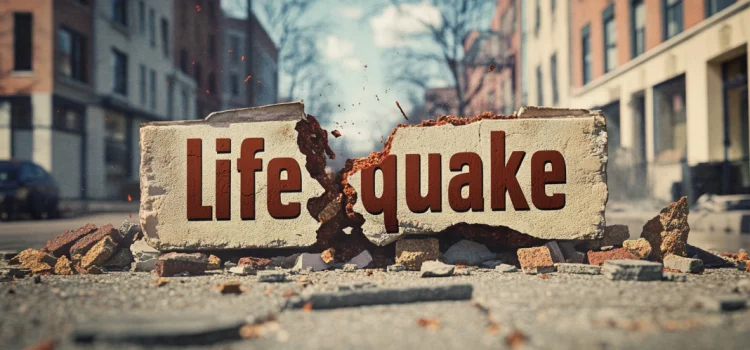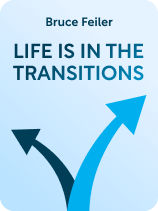

This article is an excerpt from the Shortform book guide to "Life Is in the Transitions" by Bruce Feiler. Shortform has the world's best summaries and analyses of books you should be reading.
Like this article? Sign up for a free trial here.
What is a “lifequake”? Why are some life experiences more transformative than others?
In his book Life Is in the Transitions, Bruce Feiler discusses what he calls “lifequakes.” A lifequake is an event that’s so significant that there was life before the event and life after.
Keep reading to learn all about Feiler’s lifequakes.
Lifequakes
One major type of life change that Bruce Feiler describes in his book is what he calls a “lifequake.” These are events that redefine how we think about and derive meaning from our lives. Lifequakes are grander than disruptors, so much so that we use them to mark the passage of time. For example, instead of thinking of your life in terms of decades, you might think in terms of the time before and after you got married. What makes a life change transformative is relative: Some people go through major traumas that aren’t transformative because their view of life doesn’t fundamentally change; others are thrown onto an entirely new course by a seemingly minor event.
Lifequakes can fall into any of the five categories of adjustments that Feiler describes. They may be events you willingly choose, like getting sober or adopting a child, or events that are out of your control, like chronic illness. According to Feiler’s research, transformations tend to be personal rather than collective—for example, a personal diagnosis is more likely to be transformative than an international pandemic.
Why do certain life changes become transformative? Feiler points to moments of vulnerability as the deciding factor. He explains that when you experience an adjustment during a difficult time, multiple adjustments in a row, or a slew of adjustments all at once, they’re more likely to shake up your life in a profound way. For example, say you’ve been looking for a new job, but your applications keep getting rejected. The final rejection letter could become transformative if the stress and frustration from repeated setbacks have accumulated, leaving you feeling vulnerable and questioning your sense of self and purpose. Your heightened vulnerability could trigger a major career pivot where you decide to change fields or go back to school.
| What Makes a Life Event Transformative? Feiler says that Lifequakes change the way you think about your life, but some evidence suggests the opposite: Whether a given life event is transformative could be determined by your cognitive appraisal of the situation. Researchers define cognitive appraisal as your interpretation of an event to determine its significance and impact on your well-being. This can be done consciously or unconsciously. If your appraisal of the event helps it fit well into your life narrative (the story you tell yourself about your life), it may not be transformative. For example, if you always saw yourself becoming a parent but it happened sooner than you expected, that might just be an adjustment. If you always wanted kids but struggle with infertility, that may be transformative because it upends your life narrative entirely. This may lead to the before-and-after thinking Feiler mentions, which experts note is common among people who’ve experienced trauma. (Trauma is traditionally associated with life-threatening experiences, but any event that profoundly disrupts your sense of self, identity, or life trajectory—from infertility to job loss and breakups—can be experienced as traumatic.) Feiler also suggests that personal experiences are more likely to be transformative than collective experiences. One reason for this could be that people who suffer collective traumas, like pandemics and wars, can turn to each other for support. In contrast, personal trauma tends to be isolating, which can magnify the effects of the traumatic event—making it seem more transformative than communal experiences. This may also help explain the link between vulnerability and transformation that Feiler points out—people feel stronger and demonstrate greater resilience when they have community support, whereas facing a challenge (or multiple challenges) alone can intensify the sense of upheaval and transformation. Of course, as Feiler notes, not every transformation is traumatic—some changes are welcome. But even positive transformations can be difficult to navigate, since they require making changes to your life narrative in the same way negative transformations do. For example, this is why some people get “cold feet” when they’re about to be married. Psychologists refer to the kind of stress that results from positive life changes as eustress and explain that it can be just as overwhelming as distress in large doses. Ahead, we’ll discuss ways to manage and embrace both positive and negative transformations, helping you find balance and meaning in the midst of change. |

———End of Preview———
Like what you just read? Read the rest of the world's best book summary and analysis of Bruce Feiler's "Life Is in the Transitions" at Shortform.
Here's what you'll find in our full Life Is in the Transitions summary:
- How to deal with curveballs and obstacles in life
- The pattern that most of life’s disruptions follow
- How to rewrite your life story in a positive way






